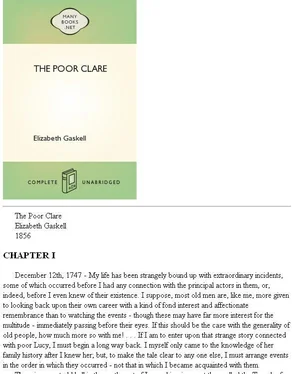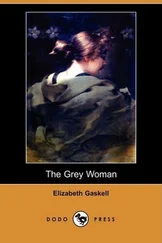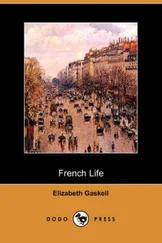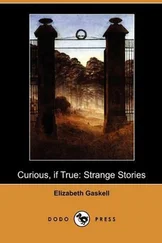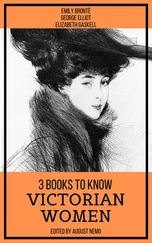'I fancy that some physician could have disabused your father of his belief in visions —
Just at that moment, standing as I was opposite to her in the full and perfect morning light, I saw behind her another figure — a ghastly resemblance, complete in likeness, so far as form and feature and minutest touch of dress could go, but with a loathsome demon soul looking out of the grey eyes, that were in turns mocking and voluptuous. My heart stood still within me; every hair rose up erect; my flesh crept with horror. I could not see the grave and tender Lucy — my eyes were fascinated by the creature beyond. I know not why, but I put out my hand to clutch it; I grasped nothing but empty air, and my whole blood curdled to ice. For a moment I could not see; then my sight came back, and I saw Lucy standing before me, alone, deathly pale, and, I could have fancied, almost shrunk in size.
'IT has been near me? she said, as if asking a question.
The sound seemed taken out of her voice; it was husky as the notes on an old harpsichord when the strings have ceased to vibrate. She read her answer in my face, I suppose, for I could not speak. Her look was one of intense fear, but that died away into an aspect of most humble patience. At length she seemed to force herself to face behind and around her: she saw the purple moors, the blue distant hills, quivering in the sunlight, but nothing else.
'Will you take me home? she said meekly.
I took her by the hand, and led her silently through the budding heather — we dared not speak; for we could not tell but that the dread creature was listening, although unseen — but that IT might appear and push us asunder. I never loved her more fondly than now when — and that was the unspeakable misery — the idea of her was becoming so inextricably blended with the shuddering thought of IT. She seemed to understand what I must be feeling. She let go my hand, which she had kept clasped until then, when we reached the garden gate, and went forwards to meet her anxious friend, who was standing by the window looking for her. I could not enter the house: I needed silence, society, leisure, change — I knew not what — to shake off the sensation of that creature 's presence. Yet I lingered about the garden — I hardly know why; partly, I suppose, because I feared to encounter the resemblance again on the solitary common, where it had vanished, and partly from a feeling of inexpressible compassion for Lucy. In a few minutes Mistress Clarke came forth and joined me. We walked some paces in silence.
'You know all, now, said she solemnly.
'I saw IT, said I, below my breath.
'And you shrink from us, now, she said, with a hopelessness which stirred up all that was brave or good in me.
'Not a whit, said I. 'Human flesh shrinks from encounter with the powers of darkness; and, for some reason unknown to me, the pure and holy Lucy is their victim.
'The sins of the fathers shall be visited upon the children, she said.
'Who is her father? asked I. 'Knowing as much as I do, I may surely know more — know all. Tell me, I entreat you, madam, all that you can conjecture respecting this demoniac persecution of one so good.
'I will; but not now. I must go to Lucy now. Come this afternoon, I will see you alone; and oh, sir, I will trust that you may yet find some way to help us in our sore trouble!
I was miserably exhausted by the swooning affright which had taken possession of me. When I reached the inn, I staggered in like one overcome by wine. I went to my own private room. It was some time before I saw that the weekly post had come in, and brought me my letters. There was one from my uncle, one from my home in Devonshire, and one, re-directed over the first address, sealed with a great coat of arms. It was from Sir Philip Tempest: my letter of inquiry respecting Mary Fitzgerald had reached him at LiŽge, where it so happened that the Count de la Tour d'Auvergne was quartered at the very time. He remembered his wife's beautiful attendant; she had had high words with the deceased countess, respecting her intercourse with an English gentleman of good standing, who was also in the foreign service. The countess augured evil of his intentions; while Mary, proud and vehement, asserted that he would soon marry her, and resented her mistress's warning as an insult. The consequence was, that she had left Madame de la Tour d'Auvergne's service, and, as the Count believed, had gone to live with the Englishman; whether he had married her, or not, he could not say. 'But, added Sir Philip Tempest, 'you may easily hear what particulars you wish to know respecting Mary Fitzgerald from the Englishman himself, if, as I suspect, he is no other than my neighbour and former acquaintance, Mr. Gisborne, of Skipford Hall, in the West Riding. I am led to the belief that he is no other, by several small particulars, none of which arc in themselves conclusive, but which, taken together, furnish a mass of presumptive evidence. As far as I could make out from the Count's foreign pronunciation Gisborne was the name of the Englishman; I know that Gisborne of Skipford was abroad and in the foreign service at that time — he was a likely fellow enough for such an exploit, and, above all, certain expressions recur to my mind which he used in reference to old Bridget Fitzgerald, of Coldholme, whom he once encountered while staying with me at Starkey Manor-house. I remember that the meeting seemed to have produced some extraordinary effect upon his mind, as though he had suddenly discovered some connection which she might have had with his previous life. I beg you to let me know if I can be of any further service to you. Your uncle once rendered me a good turn, and I will gladly repay it, so far as in me lies, to his nephew.
I was now apparently close on the discovery which I had striven so many months to attain. But success had lost its zest. I put my letters down, and seemed to forget them all in thinking of the morning I had passed that very day. Nothing was real but the unreal presence, which had come like an evil blast across my bodily eyes, and burnt itself down upon my brain. Dinner came, and went away untouched. Early in the afternoon I walked to the farmhouse. I found Mistress Clarke alone, and I was glad and relieved. She was evidently prepared to tell me all I might wish to hear.
'You asked me for Mistress Lucy's true name; it is Gisborne, she began.
'Not Gisborne of Skipford? I exclaimed, breathless with anticipation.
'The same, said she quietly, not regarding my manner. 'Her father is a man of note; although, being a Roman Catholic, he cannot take that rank in this country to which his station entitles him. The consequence is that he lives much abroad — has been a soldier, I am told.
'And Lucy's mother? I asked.
She shook her head. 'I never knew her, said she. 'Lucy was about three years old when I was engaged to take charge of her. Her mother was dead.
'But you know her name? — you can tell if it was Mary Fitzgerald?
She looked astonished. 'That was her name. But, sir, how came you to be so well acquainted with it? It was a mystery to the whole household at Skipford Court. She was some beautiful young woman whom he lured away from her protectors while he was abroad. I have heard that he practised some terrible deceit upon her, and when she came to know it, she was neither to have nor to hold, but rushed off from his very arms, and threw herself into a rapid stream and was drowned. It stung him deep with remorse, but I used to think the remembrance of the mother's cruel death made him love the child yet clearer.
I told her, as briefly as might be, of my researches after the descendant and heir of the Fitzgeralds of Kildoon, and added — something of my old lawyer spirit returning into me for the moment — that I had no doubt but that we should prove Lucy to be by right possessed of large estates in Ireland.
Читать дальше
